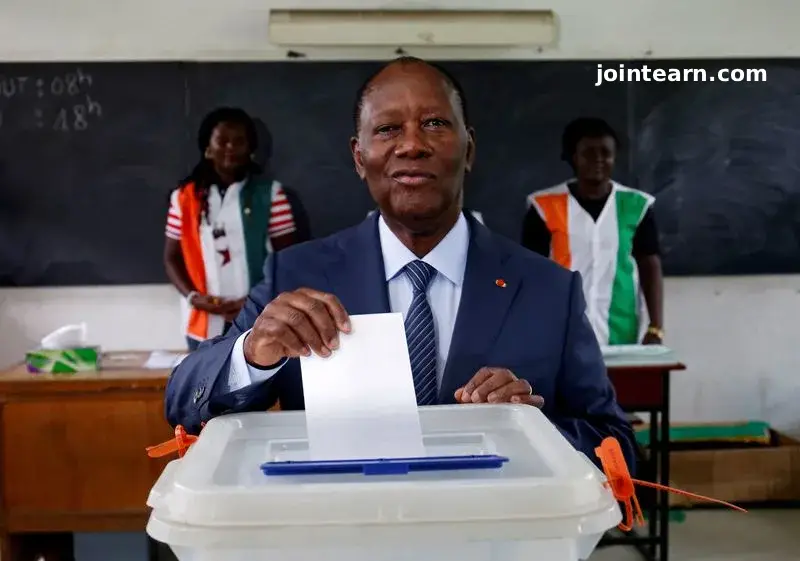
Ouattara Seeks Fourth Term as Ivory Coast Heads Into Crucial 2025 Presidential Election
ABIDJAN, Ivory Coast — As West Africa’s largest cocoa-producing nation prepares for a pivotal election on October 25, 2025, President Alassane Dramane Ouattara is once again in the spotlight. The 83-year-old leader, who has steered Ivory Coast through more than a decade of economic expansion, is hoping to secure a fourth term in office, leveraging his record of growth and infrastructure development.
Since first assuming power in 2011 after a brutal post-election conflict, Ouattara has presided over an era of relative political stability and economic transformation, with Ivory Coast becoming one of the continent’s fastest-growing economies.
However, his renewed bid for power has reignited debate over democracy, succession, and political inclusion, as key opposition figures remain barred from contesting.
A Legacy of Economic Growth and Modernization
Ouattara’s supporters credit his tenure with revitalizing Ivory Coast’s economy, which has consistently outpaced regional averages. Under his leadership, the country has seen major infrastructure investments, including new highways, overpasses, and energy projects designed to improve connectivity and attract foreign investment.
One of his flagship initiatives, the Abidjan Metro Project, is expected to revolutionize urban transport in the commercial capital, while construction of a 300-meter skyscraper symbolizes the country’s modernization ambitions.
Economic growth under Ouattara has been driven by agriculture, infrastructure development, and private sector expansion, turning Ivory Coast into a regional economic hub.
“President Ouattara has built a foundation for prosperity,” said Cesar Flan Moquet, director of the Centre of Political Research in Abidjan. “His leadership has transformed Ivory Coast’s global image from instability to opportunity.”
Criticism Over Restrictions on Political Freedoms
Despite economic successes, human rights groups and opposition parties accuse Ouattara’s administration of undermining democratic freedoms. Amnesty International recently criticized what it called a “disproportionate ban” on election-related protests, saying such restrictions suppress legitimate political dissent.
Moreover, the exclusion of prominent figures like former Credit Suisse CEO Tidjane Thiam — disqualified for allegedly holding dual nationality — has drawn international attention. Another former president, Laurent Gbagbo, remains ineligible due to a prior conviction, further narrowing the political field.
As a result, the four remaining opposition candidates, lacking the backing of major political parties, have struggled to build momentum. “These candidates are running fragmented campaigns with limited resources,” said Moquet. “Their chances of unseating Ouattara are minimal.”
From Exile to the Presidency: Ouattara’s Tumultuous Political Journey
Born in Dimbokro, central Ivory Coast, on January 1, 1942, Alassane Ouattara’s journey to the presidency has been marked by resilience and controversy. A former deputy director at the International Monetary Fund (IMF) and prime minister under founding president Félix Houphouët-Boigny, Ouattara was twice disqualified from presidential contests in the 1990s and 2000s due to disputes over his nationality.
In the 1995 election, he was barred for not having lived in the country for five consecutive years. Later, in 2000, opponents alleged he had foreign lineage from Burkina Faso, accusations rooted in long-standing ethnic and xenophobic tensions.
The 2002 civil conflict deepened those divisions, splitting the country into a rebel-controlled north and a government-held south. The rebellion, largely fueled by anti-northern sentiment, set the stage for Ouattara’s eventual rise.
After forging an alliance with former president Henri Konan Bédié, Ouattara won the 2010 presidential election, defeating incumbent Laurent Gbagbo. However, Gbagbo’s refusal to concede triggered a five-month civil war that left nearly 3,000 people dead. Ouattara was finally sworn in in April 2011, ushering in a new era of reconstruction.
Security and Stability Ahead of the 2025 Election
Ivory Coast’s political climate remains calmer than in 2020, when protests over Ouattara’s controversial third term claim — following a 2016 constitutional reset — led to 85 deaths.
For this election, authorities have banned political rallies and deployed 44,000 security personnel to ensure stability. Analysts say these measures aim to prevent unrest but also reflect the government’s determination to control the narrative.
“Security measures will likely keep tensions low,” said political risk consultant Jessica Moody, “but they also highlight the fragility of Ivory Coast’s democratic process.”
Focus on the Economy and the Future of Leadership
If re-elected, Ouattara’s administration is expected to concentrate on achieving Vision 2030, which aims to transform Ivory Coast into a middle-income nation. Priorities include expanding rural electrification, improving access to clean water, and promoting industrialization.
However, the question of succession looms large. Ouattara’s preferred successor, former Prime Minister Amadou Gon Coulibaly, passed away in 2020, forcing him to run again. The ruling party remains divided on who might follow Ouattara once he steps down.
“I don’t think he lacks the motivation to hand over power,” said Moody. “But identifying a unifying successor in a polarized political environment will be a serious challenge.”
A Leader Balancing Legacy and Longevity
Now 83 years old, Ouattara would be 88 by the next election. His potential fourth term could be his last opportunity to cement his legacy as a nation builder and economic reformer, though critics warn that over-centralized power risks reversing democratic progress.
As Ivory Coast prepares for the October 25 polls, the outcome will determine whether Ouattara’s blend of economic pragmatism and political control can continue to hold the country together — or if rising calls for generational change will reshape the nation’s political future.


Leave a Reply